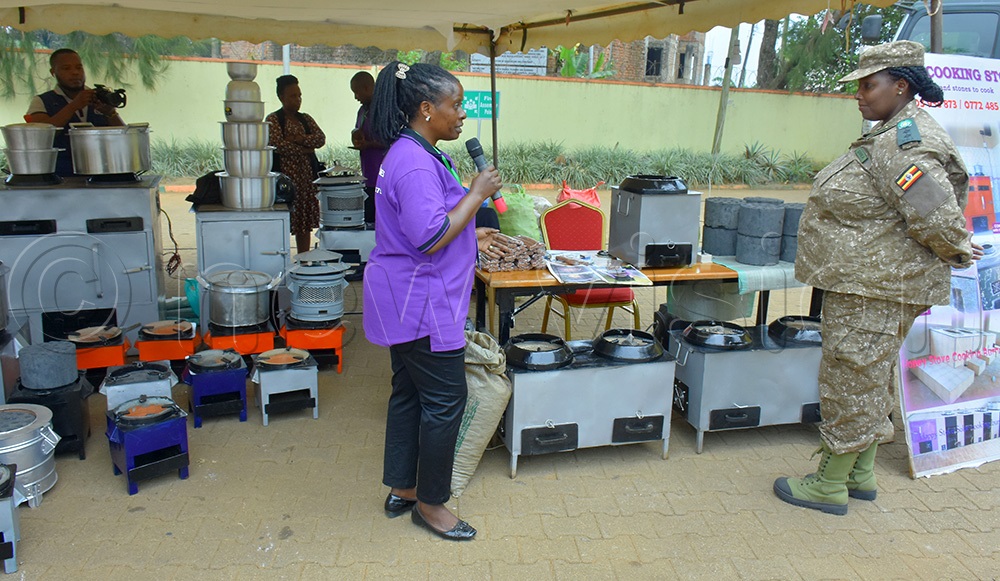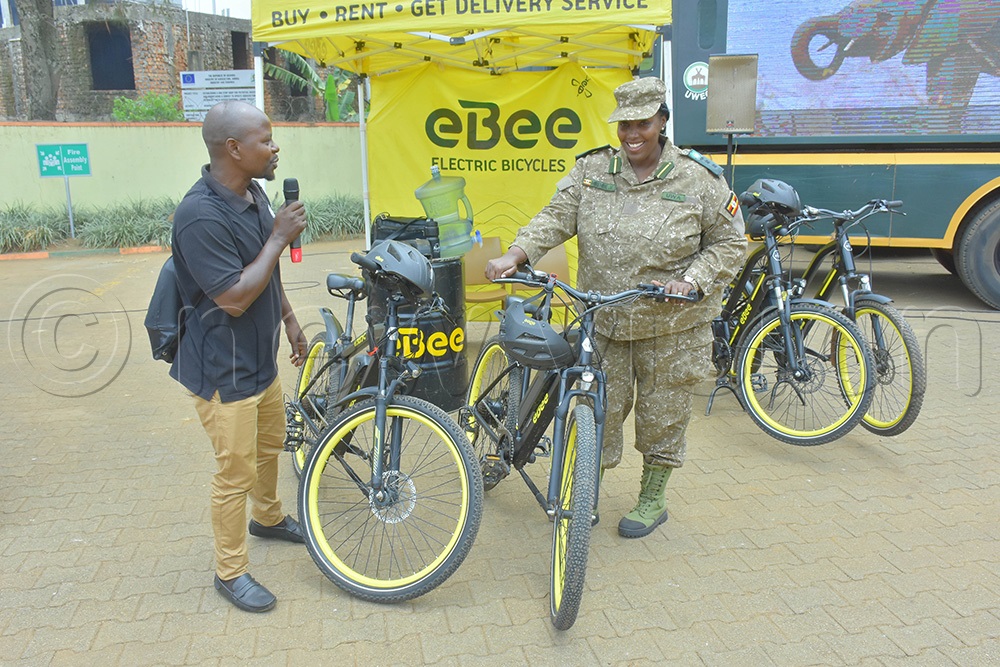UWA unveils clean energy project to reduce pressure on protected areas
The events attracted several individual exhibitors as well as companies and different organisations. In a similar regard, over 50 schools attended the exhibition for learners to get knowledge on the generation and use of clean energy.
Benedicto Kiwanuka (right) who works with Ebenezer Energy Company explaining to some of the learners on the use of solar powered cooking stoves among others that use volcanic stones during the exhibition of clean energy at Uganda Wildlife Education Centre (UWEC) in Entebbe municipality. (Photo by Julius Luwemba)
___________________
The Uganda Wildlife Authority (UWA) has embarked on a campaign to popularise the use of clean energy as an alternative source of power and fuel, to replace fossil fuels, as well as reduce pressure on the protected areas.
The maiden clean-energy exhibition was held on Friday at the Uganda Wildlife Conservation Education Centre (UWEC).
The events attracted several individual exhibitors as well as companies and different organisations. In a similar regard, over 50 schools attended the exhibition for learners to get knowledge on the generation and use of clean energy.
Vanice Mirembe (right), the UWA Manager in charge of conservation education and awareness, inspecting some of the stalls displaying cooking stoves that use solar. (Photo by Julius Luwemba)
Francis Ruhinirwa, the UWA conservation education officer based at UWEC, says that the clean-energy exhibition targeted school operators and learners, saying they give a strong foundation for knowledge transfer.
"We want several schools to adopt this type of energy use, such as using solar to power classrooms and student dormitories, but also impart the same knowledge to their respective learners as a sustainable way of transcending this kind of knowledge," said Runihirwa.
The exhibition will happen annually to attract individuals, companies and organisations dealing in clean energy.
The aim is to showcase their products as well as transfer the same knowledge to learners across the board.
During the maiden exhibition, several companies exhibited solar cooking stoves, rechargeable motorbikes, cars and bicycles, among other machines used in daily life.
Protecting forests
"Our cooking stoves use volcanic stones found around any volcanic mountain in Uganda. People in areas of Kisoro (South Western Uganda) or Mbale (Eastern Uganda) can easily collect those stones and use them for cooking. They produce no smoke, yet a few stones can cook for over two years.
If people adopt this kind of knowledge, it will reduce pressure on the forests within the protected areas such as Mount Elgon and Mgahinga national parks," explained one Benedicto Kiwanuka, who works with Ebenezer Energy Company.

Vanice Mirembe (right), the UWA Manager in charge of conservation education and awareness, inspecting some of the rechargeable bicycles that use clean energy. (Photo by Julius Luwemba)
Vanice Mirembe, the UWA Manager in charge of conservation education and awareness, further expounded that whereas similar programmes have long been carried out in communities surrounding protected areas, the campaign launched on Friday will target schools and learners across the country.
"UWA has been having projects in communities around protected areas, especially supporting them in the construction of energy-cooking stoves, making briquettes, and using invasive species for firewood. We have reports of a drop in cases of encroachment and human-wildlife conflicts in such communities where these programs are rolled out.
The clean energy exhibition is part of that campaign that we envisage to reduce pressure on the protected areas by engaging learners and schools," Mirembe explained.
David Musingo, the chief warden for UWEC conservation area, avers that the clean energy campaign is in tandem with the new UWA strategic plan that emphasises collaborative wildlife management between UWA and the community, especially at the conservation area level.
"We shall continue having such engagements that bring us closer to the communities so that we can impact on their attitude, behaviour and actions through awareness," Musingo noted.